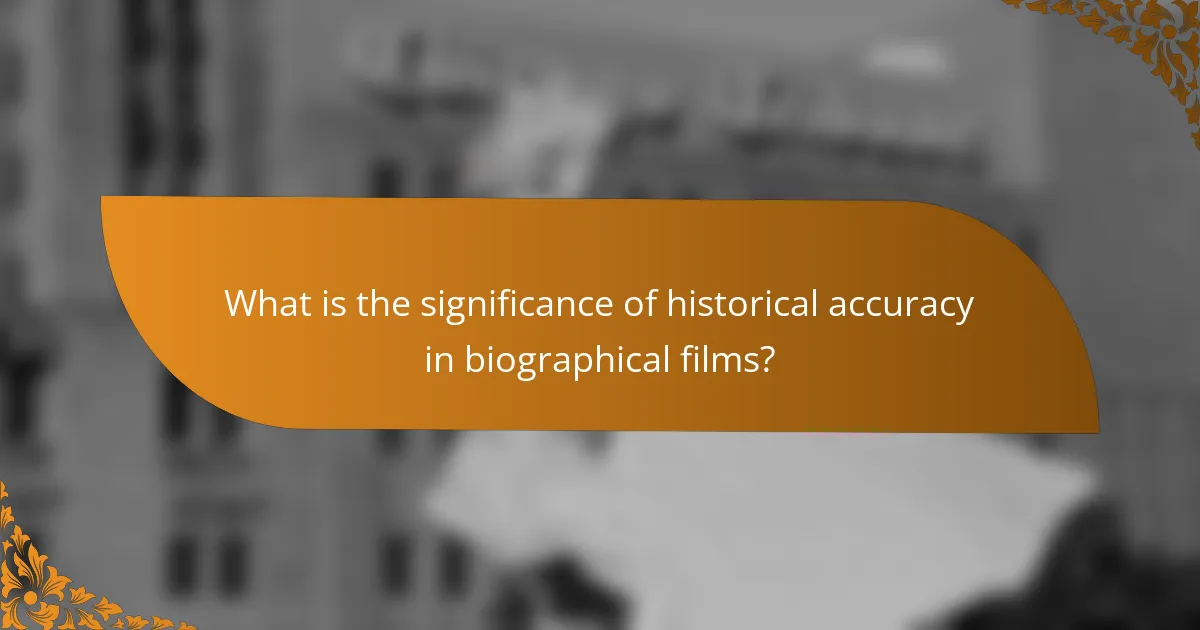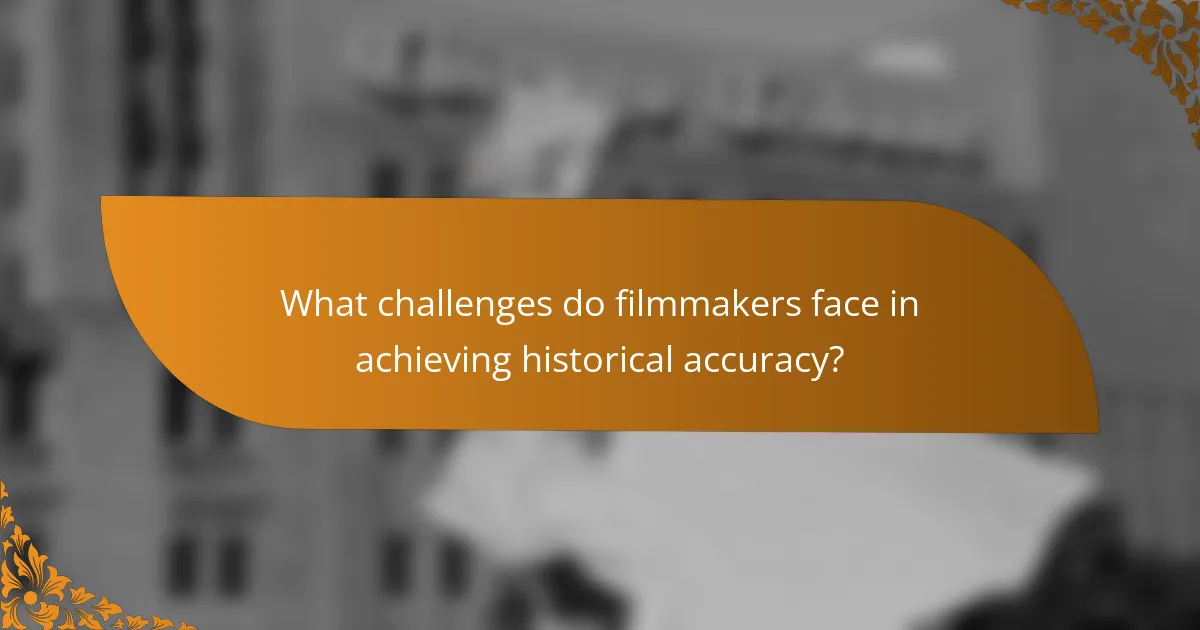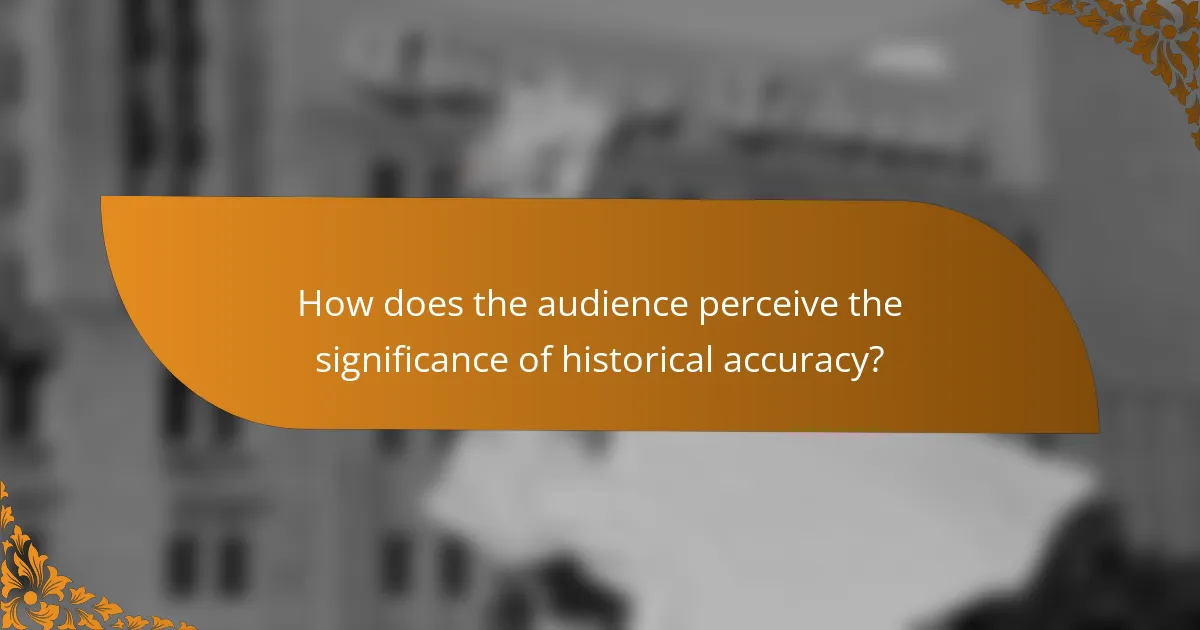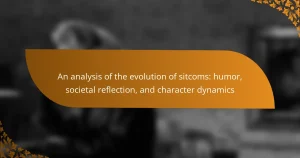
What is the significance of historical accuracy in biographical films?
Historical accuracy in biographical films is significant for several reasons. It ensures the portrayal of real events and figures is truthful. Audiences expect factual representations of historical figures. Accuracy fosters trust between filmmakers and viewers. It also aids in educating the public about history. For example, films like “Schindler’s List” highlight the Holocaust accurately, impacting societal understanding. Inaccurate portrayals can lead to misconceptions about history. A notable instance is “The Patriot,” which faced criticism for its historical inaccuracies. Thus, historical accuracy shapes both the film’s integrity and its reception.
How does historical accuracy impact the storytelling in biographical films?
Historical accuracy significantly impacts storytelling in biographical films. It shapes audience perception and emotional engagement. When films accurately depict events and characters, they enhance credibility. This credibility fosters trust in the narrative. Conversely, inaccuracies can lead to audience skepticism. They may question the film’s overall message and intent. For instance, the film “The Imitation Game” faced criticism for its portrayal of Alan Turing’s life. Critics argued that it oversimplified key relationships and events. Such critiques highlight how historical fidelity influences viewer reception and interpretation. Ultimately, historical accuracy is crucial for authentic storytelling in biographical films.
What are the key elements that contribute to historical accuracy in these films?
Key elements that contribute to historical accuracy in biographical films include thorough research, expert consultation, and adherence to primary sources. Thorough research ensures that filmmakers gather factual information about events and figures. This research often involves examining historical documents, letters, and diaries. Expert consultation with historians or scholars can provide insights into the context and significance of events. Adherence to primary sources allows filmmakers to depict events as they actually occurred. For instance, films like “Schindler’s List” utilized survivor testimonies and historical records to enhance accuracy. These elements collectively help maintain the integrity of the narrative presented in biographical films.
How do filmmakers balance artistic license with historical truth?
Filmmakers balance artistic license with historical truth by prioritizing narrative engagement while maintaining factual integrity. They often simplify complex historical events for clarity. This approach allows audiences to connect emotionally with the story. Filmmakers may adjust timelines or combine characters to enhance drama. However, they typically consult historians to ensure accuracy in key details. For instance, the film “Lincoln” received praise for its depiction of historical events while also dramatizing certain dialogues. This method helps maintain viewer interest without completely sacrificing historical context. Filmmakers aim to educate while entertaining, making historical narratives accessible to a broader audience.
Why is historical accuracy important for audience reception?
Historical accuracy is crucial for audience reception because it enhances credibility and engagement. When a biographical film accurately represents historical events, viewers are more likely to trust the narrative. This trust fosters a deeper emotional connection to the story and characters. Accurate depictions can also educate audiences, providing them with valuable insights into the past. For example, films like “Schindler’s List” have been praised for their historical fidelity, which contributed to their critical acclaim and audience impact. Inaccuracies, on the other hand, can lead to viewer disappointment and skepticism. This can diminish the film’s overall effectiveness and reception.
How does historical accuracy influence viewer trust and engagement?
Historical accuracy significantly influences viewer trust and engagement in biographical films. When films portray events and characters accurately, they foster a sense of credibility. Viewers are more likely to trust narratives that align with established historical facts. Research indicates that audiences prefer films that provide factual representations over those that take creative liberties. A study by the University of Southern California found that viewers rated historically accurate films higher in trustworthiness. Additionally, accurate portrayals can enhance emotional engagement, as audiences connect more deeply with authentic stories. In contrast, historical inaccuracies can lead to skepticism and disengagement. Thus, the portrayal of history directly impacts viewer perceptions and interactions with the film.
What role does audience expectation play in the reception of biographical films?
Audience expectation significantly influences the reception of biographical films. Viewers often anticipate a blend of entertainment and factual representation. High expectations for historical accuracy can lead to disappointment if the film diverges from known facts. Conversely, films that meet or exceed these expectations tend to receive positive reviews. For instance, “The Theory of Everything” was praised for its portrayal of Stephen Hawking, aligning with audience expectations of accuracy. Research indicates that films perceived as authentic resonate more with viewers, enhancing emotional engagement and overall satisfaction. Thus, audience expectations shape both critical reception and box office success.

What challenges do filmmakers face in achieving historical accuracy?
Filmmakers face several challenges in achieving historical accuracy. One challenge is the availability of reliable historical sources. Many events lack comprehensive documentation, leading to gaps in knowledge. Another challenge is the need for dramatic storytelling. Filmmakers often alter facts for narrative coherence or audience engagement. This can lead to misrepresentation of historical figures or events. Additionally, filmmakers must navigate differing interpretations of history. Historians may disagree on the significance or details of events, complicating the portrayal. Budget constraints also limit the ability to conduct thorough research or recreate accurate settings. These challenges can affect the authenticity and credibility of biographical films.
How do differing interpretations of history affect biographical films?
Differing interpretations of history significantly affect biographical films by shaping their narratives and character portrayals. Filmmakers often select specific historical perspectives to align with their artistic vision. This can lead to dramatizations that prioritize emotional impact over factual accuracy. For example, the film “The Imitation Game” presents Alan Turing’s story with creative liberties that emphasize his contributions to codebreaking while downplaying other aspects of his life. Such choices can influence public perceptions of historical figures. Audience reception may vary based on how closely viewers align with the film’s interpretation of events. Films that take a more controversial stance may provoke debate and scrutiny regarding their historical fidelity. This dynamic illustrates the tension between storytelling and historical truth in cinema.
What are the controversies surrounding historical figures portrayed in films?
Controversies surrounding historical figures portrayed in films often stem from inaccuracies and dramatizations. Filmmakers may prioritize storytelling over factual representation. This can lead to misinterpretations of events and characters. For example, the film “The Imitation Game” faced criticism for its portrayal of Alan Turing’s personal life. Critics argued it oversimplified his struggles and relationship dynamics. Additionally, films like “J. Edgar” have been scrutinized for their depiction of J. Edgar Hoover’s sexuality and political actions. Such portrayals can influence public perception and historical understanding. These controversies highlight the tension between artistic license and historical fidelity in cinema.
How do filmmakers navigate historical gaps or uncertainties?
Filmmakers navigate historical gaps or uncertainties by conducting extensive research. They consult historians and primary sources to gather accurate information. Filmmakers often use creative license to fill in gaps. This can involve dramatizing events or creating composite characters. They aim to maintain the essence of historical events while enhancing narrative engagement. For instance, films like “The King’s Speech” incorporate fictionalized dialogue to enrich character development. Furthermore, filmmakers may include disclaimers about historical interpretation. This approach allows audiences to understand the blend of fact and fiction. Overall, filmmakers balance historical fidelity with storytelling needs.
In what ways do historical inaccuracies impact critical reception?
Historical inaccuracies can significantly impact critical reception by influencing audience trust and engagement. When a biographical film presents factual errors, it can lead to skepticism about the film’s overall authenticity. Critics often assess the accuracy of historical representation as a key factor in their reviews. Inaccuracies can detract from the film’s educational value, making it less appealing to historians and educators. For instance, the film “The Patriot” faced criticism for its portrayal of historical events during the American Revolution. Critics noted that the film distorted key facts, which affected its reception among audiences seeking historical truth. Additionally, films that prioritize dramatic storytelling over factual accuracy may alienate viewers who value authenticity. Therefore, historical inaccuracies can diminish a film’s credibility and reduce its overall critical acclaim.
What are the common criticisms faced by biographical films regarding accuracy?
Biographical films often face criticisms regarding their accuracy. Critics argue that these films frequently take creative liberties with facts. This can lead to misrepresentation of historical events and figures. For instance, timelines may be altered to enhance dramatic effect. Key relationships or events may be exaggerated or simplified. This can distort the audience’s understanding of the subject’s life. Scholars have noted that such inaccuracies can undermine the educational value of the films. A study by the American Historical Association emphasizes the importance of fidelity to historical facts in media portrayals. These inaccuracies can provoke backlash from historians and audiences alike.
How do historical inaccuracies affect awards and accolades for films?
Historical inaccuracies can negatively impact awards and accolades for films. When films portray events or figures inaccurately, critics and audiences may question their authenticity. This skepticism can lead to lower ratings and diminished recognition from award bodies. For instance, films like “The King’s Speech” faced scrutiny over historical liberties taken, which affected its critical reception. Awards such as the Oscars often consider a film’s adherence to historical truth in their evaluations. Films that prioritize accuracy tend to receive greater acclaim and recognition. Thus, historical fidelity plays a crucial role in a film’s success in awards circuits.

How does the audience perceive the significance of historical accuracy?
The audience perceives historical accuracy as crucial in biographical films. They believe it enhances credibility and engagement. Accurate portrayals allow viewers to connect with real events and figures. This connection fosters a deeper understanding of history. Audiences often critique films based on their fidelity to historical facts. Research indicates that inaccuracies can diminish viewer satisfaction. A study by the University of Southern California found that 78% of viewers prefer historically accurate films. This preference reflects a desire for authenticity in storytelling. Overall, the audience values historical accuracy as a key element in their film experience.
What factors contribute to audience awareness of historical accuracy in films?
Audience awareness of historical accuracy in films is influenced by several factors. One primary factor is the availability of historical information. Audiences often research historical events and figures before or after watching a film. This research can include reading books, articles, and watching documentaries. Another factor is the portrayal of historical events in media. Documentaries and educational programs can shape audience expectations and knowledge. The credibility of the filmmakers also plays a role. Filmmakers with a reputation for accuracy tend to garner more trust from viewers. Additionally, public discourse around a film can impact perceptions of its historical accuracy. Reviews, critiques, and discussions on social media often highlight discrepancies. Finally, personal background and education of the audience can influence their ability to discern accuracy. Individuals with a strong historical education may notice inaccuracies more readily.
How does media literacy influence audience reception of biographical films?
Media literacy significantly influences audience reception of biographical films. Higher media literacy enables viewers to critically evaluate the accuracy and representation of historical events. This critical evaluation leads to a more discerning understanding of the film’s content. Audiences with strong media literacy skills are more likely to identify biases and inaccuracies in portrayals. Research indicates that informed viewers engage more deeply with the narrative and context of the film. For instance, studies show that media-literate individuals are better at distinguishing between fact and artistic interpretation. This ability enhances their overall viewing experience and satisfaction. Consequently, media literacy plays a crucial role in shaping perceptions of historical accuracy in biographical films.
What are the implications of audience feedback on future film productions?
Audience feedback significantly influences future film productions. It shapes creative decisions, marketing strategies, and audience engagement. Filmmakers analyze feedback to understand viewer preferences. This can lead to changes in storytelling, character development, and pacing. For instance, films that receive positive audience feedback often inspire sequels or similar projects. Conversely, negative feedback can result in re-evaluating approaches to historical accuracy. A study by the University of Southern California found that audience reception directly impacts box office performance. This demonstrates the critical role of feedback in guiding production choices.
What best practices should filmmakers follow to enhance historical accuracy?
Filmmakers should conduct thorough research to enhance historical accuracy. This involves consulting primary sources such as letters, diaries, and official documents. Engaging with historians and experts in the relevant field can provide valuable insights. Filmmakers should also visit historical sites to gain firsthand knowledge of the setting. They should prioritize depicting events, costumes, and dialogue authentically. Incorporating accurate timelines and context is essential for credibility. Additionally, filmmakers should be transparent about creative liberties taken in the narrative. This approach fosters audience trust and enhances the film’s reception.
How can collaboration with historians improve the authenticity of biographical films?
Collaboration with historians enhances the authenticity of biographical films by ensuring accurate representation of historical events and figures. Historians provide in-depth knowledge of the context surrounding the subjects. This collaboration helps filmmakers avoid anachronisms and factual inaccuracies. For example, historians can verify the accuracy of dialogue, settings, and character portrayals. Their expertise can also uncover lesser-known details that enrich the narrative. Accurate depictions foster audience trust and engagement. Historical accuracy can lead to better critical reception and audience approval. Films like “Lincoln” benefited from such collaboration, receiving praise for their authenticity.
What resources are available for filmmakers to ensure accuracy in their portrayals?
Filmmakers can access various resources to ensure accuracy in their portrayals. These resources include historical consultants who specialize in specific time periods or events. Documentaries and archival footage provide visual and contextual references. Academic journals and books offer in-depth analyses and research findings. Online databases and libraries contain primary sources, such as letters and photographs. Organizations dedicated to historical accuracy provide guidelines and best practices. Interviews with experts or individuals connected to the subject enhance authenticity. These resources collectively help filmmakers create more accurate and credible representations in biographical films.
The main entity of the article is historical accuracy in biographical films. The article examines the significance of maintaining factual representations of historical events and figures, emphasizing how accuracy influences audience trust, engagement, and overall reception. It highlights the key elements contributing to historical accuracy, the challenges filmmakers face, and the impact of audience expectations on critical reception. Additionally, the article addresses the role of differing interpretations of history, the implications of inaccuracies, and best practices for filmmakers to enhance authenticity in their portrayals.


